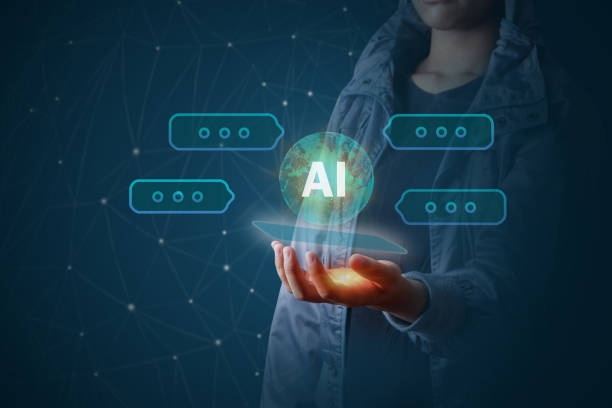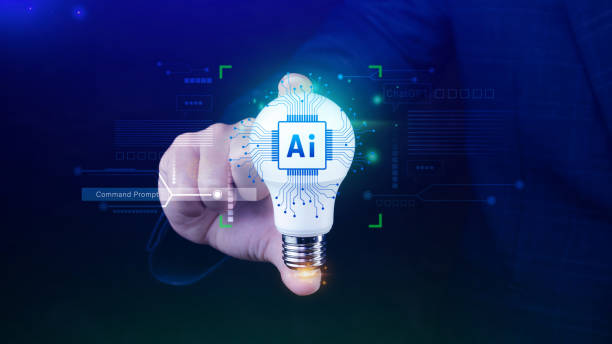What is Artificial Intelligence? Definition and Basic Concepts

#Artificial_Intelligence (Artificial Intelligence or AI) is a branch of computer science that deals with building machines that are capable of performing tasks that usually require human intelligence.
This broad definition includes abilities such as learning, reasoning, problem-solving, perception, and language understanding.
Artificial intelligence tries to create systems that can automatically solve problems, learn from experiences and make intelligent decisions.
This field includes many sub-branches including machine learning, neural networks, natural language processing and computer vision.
Artificial intelligence can transform human life in the future, this transformation can be both positive and negative, and that is why the topic of #Artificial_Intelligence is being discussed a lot these days.
In short, artificial intelligence seeks to simulate human intelligence in machines, so that these machines can perform tasks that require thinking, learning and decision-making.
To better understand the concept of artificial intelligence, it can be divided into two general categories: Weak Artificial Intelligence (Narrow AI) designed to perform specific tasks, and Strong Artificial Intelligence (General AI) that is capable of performing any task that a human can.
Currently, most existing artificial intelligence systems fall into the category of weak artificial intelligence.
For more information about artificial intelligence, you can visit the Wikipedia page.
Are you worried about losing customers who don’t have a professional online store?
Forget these worries with online store design by Rasaweb!
✅ Significant increase in sales and visitor-to-customer conversion rate
✅ Professional and user-friendly design that gains customer trust
⚡ Get free consultation from Rasaweb
History of Artificial Intelligence from the Beginning to Today

The history of artificial intelligence goes back to the 1950s, when researchers began to explore the possibility of building machines that could think.
One of the early milestones was the Dartmouth Conference in 1956, which is known as the official birth of artificial intelligence.
At this conference, prominent researchers such as John McCarthy, Marvin Minsky and Claude Shannon gathered to explore the possibilities and challenges of artificial intelligence.
In the 1960s and 1970s, artificial intelligence faced many hopes, but due to hardware and software limitations, progress was slower than expected.
However, progress was made in areas such as expert systems and natural language processing.
In the 1980s and 1990s, with the advent of personal computers and increased processing power, artificial intelligence was once again in the spotlight.
Machine learning and neural networks emerged as powerful tools in this field.
In the 21st century, with significant advances in deep learning and access to big data, artificial intelligence reached a turning point.
Today, artificial intelligence is used in many fields such as self-driving cars, face recognition, machine translation, and virtual assistants.
Recent advances show that artificial intelligence is still evolving and has many potentials for the future.
Applications of Artificial Intelligence in Everyday Life and Various Industries

Artificial intelligence is widely used in everyday life and various industries.
In everyday life, we can refer to virtual assistants such as Siri and Alexa, which help users to perform various tasks.
Also, recommendation systems on online platforms such as Netflix and Amazon use artificial intelligence to suggest content and products of interest to users.
In industry, artificial intelligence is used in areas such as manufacturing, healthcare, and financial services.
In manufacturing, artificial intelligence is used to optimize processes, reduce costs, and increase product quality.
In healthcare, artificial intelligence helps doctors to diagnose diseases more accurately and provide more effective treatments.
In financial services, artificial intelligence is used for fraud detection, risk management, and customer service.
In general, artificial intelligence helps to improve efficiency, reduce costs and provide better services in various industries.
| Area | Application |
|---|---|
| Healthcare | Diagnosing diseases, providing personalized treatments |
| Production | Optimizing processes, reducing costs |
| Financial services | Fraud detection, risk management |
| Transportation | Self-driving cars, optimizing routes |
Machine Learning and Deep Learning are the Main Components of Artificial Intelligence

Machine Learning (ML) and Deep Learning (DL) are two important sub-branches of artificial intelligence.
Machine learning allows systems to learn from data without being explicitly programmed.
This process involves using algorithms to identify patterns in data and using these patterns to predict or make decisions.
There are different types of machine learning algorithms, including supervised learning, unsupervised learning, and reinforcement learning.
Deep learning is a subset of machine learning that uses deep neural networks with multiple layers to analyze data.
These networks are capable of learning complex patterns in data and perform very well in areas such as image recognition, natural language processing and speech recognition.
Deep learning is especially effective when the volume of data is very large.
For example, deep learning algorithms are used in self-driving cars to detect objects and people in the surrounding environment.
Did you know that 94% of users’ first impression of a business is related to its website design? With professional company website design by **Rasaweb**, turn this first impression into an opportunity for growth.
✅ Attract more customers and increase sales
✅ Create credibility and trust in the eyes of the audience⚡ Get free website design consultation!
Challenges and Limitations of Artificial Intelligence

Despite significant progress, artificial intelligence still faces challenges and limitations.
One of the most important challenges is the need for large and high-quality data to train artificial intelligence models.
Without sufficient and appropriate data, the performance of these models may be poor.
Also, the interpretability of artificial intelligence models, especially deep learning models, is a serious challenge.
In many cases, it is not clear why an artificial intelligence model has reached a particular decision, which can be problematic in applications that require transparency and explainability.
In addition, ethical and social issues related to artificial intelligence are also important.
For example, the use of artificial intelligence in judicial and hiring decisions can lead to discrimination if training data contains biases.
There are also concerns about job losses due to automation caused by artificial intelligence.
Therefore, it is necessary to develop and use artificial intelligence with regard to these challenges and limitations.
What Expectations Can Be Had for the Future of Artificial Intelligence?

The future of artificial intelligence is bright and full of potential.
It is expected that in the future, artificial intelligence will be used in more fields and improve our daily lives.
Further advances in machine learning and deep learning could lead to the development of smarter systems capable of solving more complex problems and performing a wider variety of tasks.
For example, self-driving cars can be used more widely and healthcare systems can provide better services to patients using artificial intelligence.
In addition, artificial intelligence is expected to play an important role in solving global challenges such as climate change, infectious diseases and poverty.
However, it is necessary to develop artificial intelligence with regard to ethical and social issues to prevent problems and discrimination.
Also, training and preparing the workforce for the changes caused by artificial intelligence automation is essential.
Artificial Intelligence and Its Impact on the Labor Market

Artificial intelligence has a significant impact on the labor market.
On the one hand, artificial intelligence can lead to the automation of some jobs and cause them to be lost.
Jobs that are repetitive and routine are more at risk of automation.
On the other hand, artificial intelligence can create new jobs and create the need for new skills.
Skills such as data analysis, machine learning, and artificial intelligence software development are currently in high demand.
To adapt to the changes caused by artificial intelligence, people need to keep their skills up to date and receive the necessary training.
Also, governments and organizations should provide programs to support vulnerable workers and create new job opportunities.
In general, artificial intelligence can lead to fundamental changes in the labor market and requires adaptation and flexibility.
| Impacts | Descriptions |
|---|---|
| Automation | Replacing repetitive jobs with machines |
| Job creation | Creating new jobs in the field of artificial intelligence |
| Need for skill | The need for new skills such as data analysis |
| Structural changes | Fundamental changes in the structure of the labor market |
Ethical and Legal Issues Related to Artificial Intelligence

Artificial intelligence raises important ethical and legal issues.
One of the most important issues is accountability for artificial intelligence decisions and actions.
If a self-driving car crashes, who is responsible? Are the developer, manufacturer or owner of the car responsible? These questions need legal and legal answers.
Also, issues related to privacy and data security are also important.
Artificial intelligence needs to collect and analyze a lot of data, which may include people’s personal information, to function.
It is necessary to have laws and regulations to protect privacy and prevent misuse of this data.
In addition, issues related to discrimination and justice are also important.
Artificial intelligence should not lead to discrimination and should treat everyone fairly.
Do you have an online store but your sales are not as expected? Rasaweb solves your problem forever by designing professional online stores!
✅ Significant increase in conversion rate and sales
✅ Unparalleled user experience for your customers
⚡ Click to get free consultation with Rasaweb!
The Role of Governments and Policymakers in the Development of Artificial Intelligence

Governments and policymakers play an important role in the development of artificial intelligence.
They must develop policies and laws that support the responsible and ethical development of artificial intelligence.
These policies should include items such as protecting privacy, preventing discrimination, and supporting vulnerable workers.
Also, governments should invest in artificial intelligence research and development and support innovation and entrepreneurship in this field.
Training and preparing the workforce for the changes caused by artificial intelligence is also one of the duties of governments.
In addition, governments should develop international standards in cooperation with other countries in the field of artificial intelligence and support international cooperation in this field.
Artificial Intelligence, Threat or Opportunity? A Summary

Artificial intelligence is both a threat and an opportunity.
On the one hand, artificial intelligence can lead to job automation, discrimination, and privacy violations.
On the other hand, artificial intelligence can help improve daily life, solve global challenges, and create new job opportunities.
Whether artificial intelligence is more of a threat or an opportunity depends on how we develop and use it.
In order for artificial intelligence to be more of an opportunity than a threat, we need to pay attention to ethical and social issues and develop policies and laws that support the responsible and ethical development of artificial intelligence.
We should also invest in artificial intelligence research and development and support innovation and entrepreneurship in this field.
With these considerations, we can benefit from the potential of artificial intelligence and avoid its risks.
Artificial intelligence is a phenomenon that has come to stay, it must be recognized and prepared to face it.
Frequently Asked Questions
| Question | Answer |
|---|---|
| What is the definition of Artificial Intelligence (AI)? | It is a field in computer science that aims to create intelligent machines that can think, learn, solve problems, and make decisions like humans. |
| Mention some common applications of Artificial Intelligence. | It includes self-driving cars, voice assistants (such as Siri and Alexa), recommendation systems (such as Netflix and Amazon), face recognition, and medical diagnosis. |
| What is the difference between Narrow AI (ANI) and General AI (AGI)? | Narrow AI specializes in one specific task, while General AI possesses human intellectual ability to perform any cognitive task. |
| What is Machine Learning and its relation to Artificial Intelligence? | Machine learning is a branch of artificial intelligence that focuses on developing algorithms that allow systems to learn from data without explicit programming. |
| What are Artificial Neural Networks? | They are computational models inspired by the structure and function of the human brain, and are used in deep learning to process data and discover complex patterns. |
| Mention some ethical challenges related to Artificial Intelligence. | It includes privacy issues, bias in data and algorithms, job loss, and responsibility in case of errors or unfair decisions. |
| What is Natural Language Processing (NLP)? | It is a branch of artificial intelligence that focuses on enabling computers to understand, interpret, and generate human language in a useful and interactive way. |
| How can Artificial Intelligence affect the labor market? | It can lead to the automation of some routine tasks, requiring the retraining of workers and the creation of new jobs in the fields of design, development, and maintenance of artificial intelligence systems. |
| What is Computer Vision? | It is a field in artificial intelligence that enables computers to “see,” understand, and interpret images and videos in the same way that humans do, enabling them to recognize objects and faces. |
| What is the importance of data in the development of Artificial Intelligence systems? | Data is the fuel that feeds artificial intelligence systems, especially in machine learning. The quality and quantity of data greatly affect the accuracy and performance of the models and their ability to learn and make correct decisions. |
And other services of Rasa Web Advertising Agency in the field of advertising
Intelligent UI/UX: An effective tool for digital branding by optimizing key pages.
Intelligent sales automation: A creative platform to improve sales by optimizing key pages.
Intelligent content strategy: Transform website traffic with the help of marketing automation.
Intelligent custom software: A creative platform to improve digital branding by designing an attractive user interface.
Intelligent marketing automation: Designed for businesses that seek user engagement through intelligent data analysis.
And more than a hundred other services in the field of internet advertising, advertising consulting and organizational solutions
Internet advertising | Advertising strategy | Advertorial
Resources
Artificial intelligence: How do we know when it gets out of control?
,What are the consequences of artificial intelligence and why should we be careful of it?
,Artificial intelligence is an increase for security and economy, an increase for job retention
,The dangerous alarm of artificial intelligence and its shadow for the labor market
? Are you ready to transform your business in the digital world? Rasaweb Digital Marketing Agency, specializing in corporate website design and providing comprehensive online marketing solutions, is with you to have a powerful and impactful presence on the web.
📍 Tehran, Mirdamad Street, next to the Central Bank, South Kazerun Alley, Ramin Alley No. 6
“`




